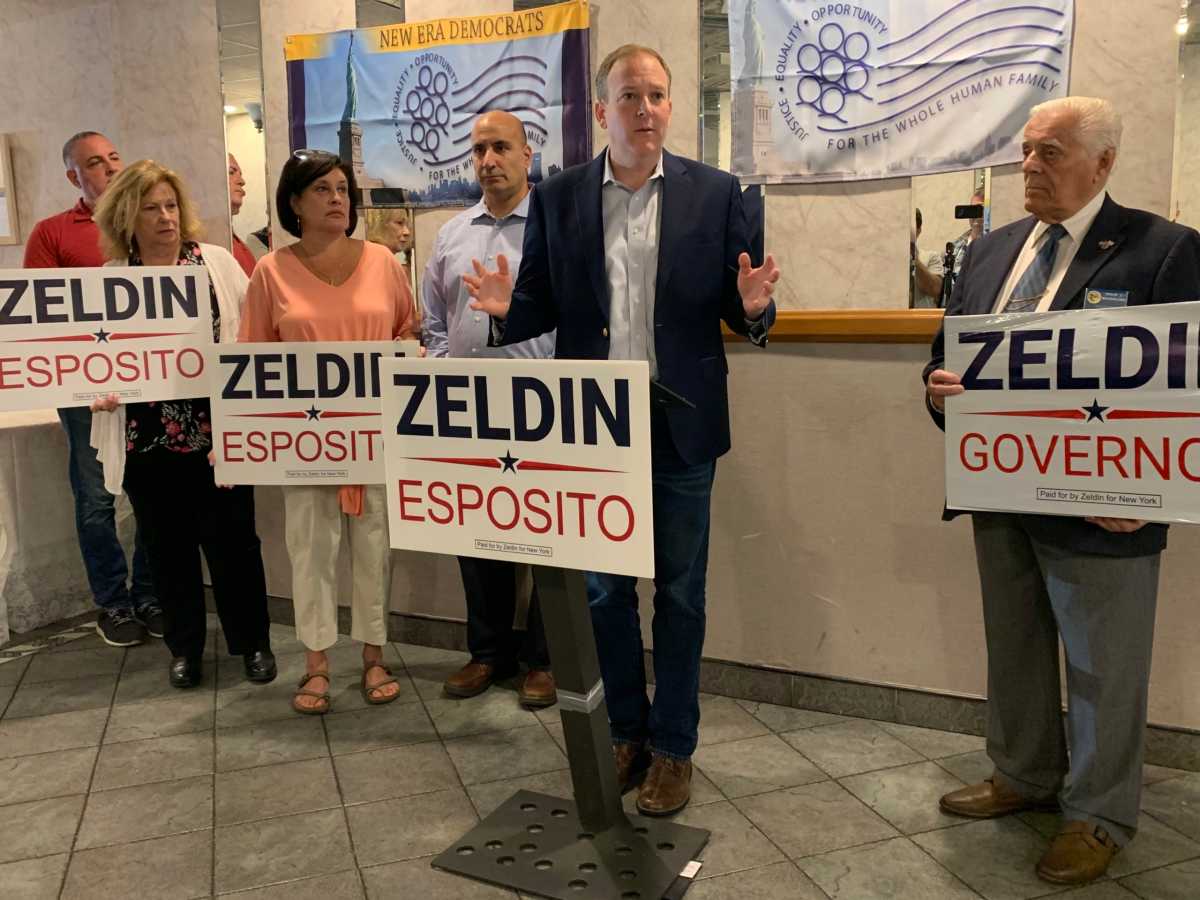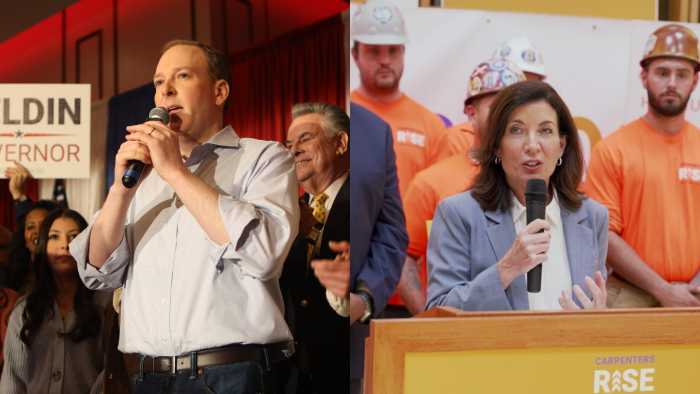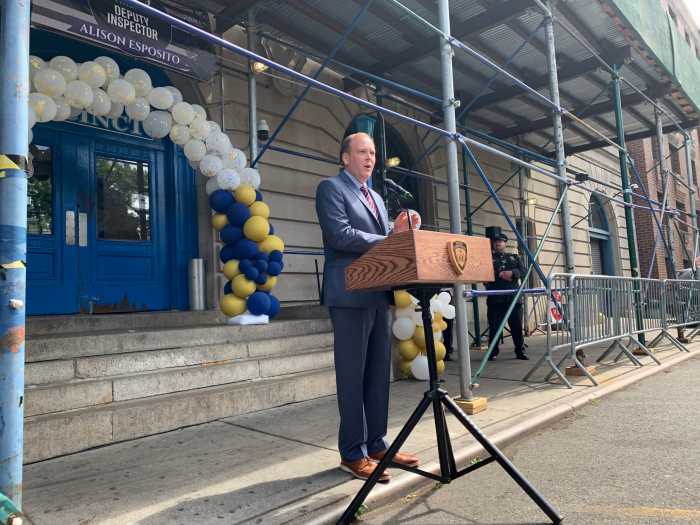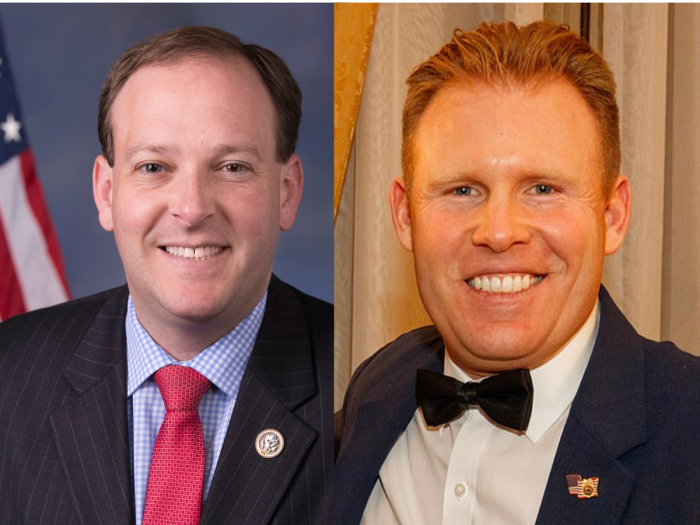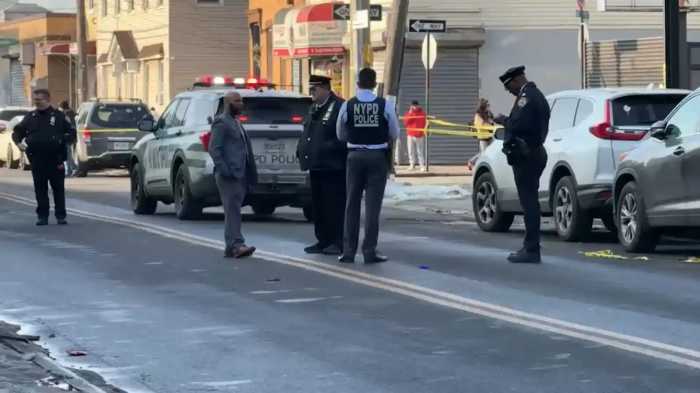A bipartisan political group that once supported former Mayor Bill de Blasio during his first City Hall run is throwing its weight behind Long Island GOP Rep. Lee Zeldin in his bid for governor against incumbent Democrat Kathy Hochul.
The New Era Democrats (NED), which still has pictures of their leadership with de Blasio during his 2013 campaign on their website’s home page, started in 1982 backing former Governor Mario Cuomo – father of disgraced ex-Governor Andrew Cuomo – over former Mayor Ed Koch in that year’s governor’s race.
During an event announcing the endorsement with Zeldin at C & C Catering Services in the Bensonhurst section of Brooklyn, NED President John Orlando said the group is throwing its support behind Zeldin because of his focus on addressing crime, nixing the MTA’s yet to be implemented congestion pricing plan and lowering taxes.
Orlando said the organization is able to support both conservative Republicans like Zeldin and liberal Democrats like de Blasio because they’re independent and endorse candidates regardless of their political party. In de Blasio’s case, he said, Mary Sansone – NED’s late founder – had a relationship with him since the time he represented several Brooklyn neighborhoods on the City Council.
“We’ve always been independent. We’re not a part of the Democratic machine. We’re not a sanctioned club,” Orlando said. “De Blasio had established a relationship with the organization and Mary Sansone over the years. So, we had known him as a councilman. And then when he ran for public advocate. So, we just maintained that relationship with him. But we have to take the moment that we’re in now and everything with the language that Lee’s speaking is our language.”
For Zeldin, NED endorsing him after previously endorsing a progressive like de Blasio, is proof there are many centrist Democrats who could support him over Hochul.
“We are all here as New Yorkers, we are not here as Republicans or Democrats or independents,” Zeldin said. “There are races in the past. There are different times in the past. And at this particular moment, it’s the people in the middle and it’s a large group. Much to the chagrin of Kathy Hochul and the most partisan Democrats that are out there, is that there are a lot of people who proudly are not stooges. There are people out there who think for themselves.”
On crime, Orlando specifically decried Hochul’s unwillingness to make further changes to the state’s bail laws, which were reformed in 2019 to eliminate most forms of cash bail for misdemeanors and some non-violent felonies. Zeldin, on the other hand, has repeatedly said he would make significant roll backs to those reforms, including allowing judges to consider a defendant’s “dangerousness” – often called a “dangerousness standard” – when deciding whether to hold them in jail pre-trial.
“The governor has been non existent on public safety,” Orlando said. “Let’s just call it what it is, she’s a crime denier. I mean, she just doesn’t see what’s in front of her. It’s a shame. There has to be a change. Public safety has to be number one.”
Orlando said he recognizes there were reforms that needed to be made to make the bail system more equitable, so that people aren’t held in jail simply because they’re low income, but that the 2019 reforms went too far.
“Yes, we all could agree reasonably, there was some social justice and reforms that we could have talked about, if reasonable people are at the table,” Orlando said. “If we all were at the table, invite some Republicans, invite prosecutors, invite law enforcement to have that conversation. I guarantee you we would have come up with some solutions to say these are some reasonable changes we can make to address some of those issues that are affecting the poor people that get arrested.”
Just last week, Hochul said implementing a dangerousness standard is a non-starter and that select roll backs she and the state legislature agreed to through the state budget process earlier this year should help bring down crime if they’re utilized by district attorneys and judges.
“What it comes down to is how the district attorneys are charging and you have cases where someone under charges a case to make it a lower offense that is not bail eligible,” Hochul said last week. “Or you have judges who, in their own determination, decide they do not want to hold someone. So we made the changes in our laws to give them the tools they need, and to close some of the loopholes that have been out there and tighten it up.”


